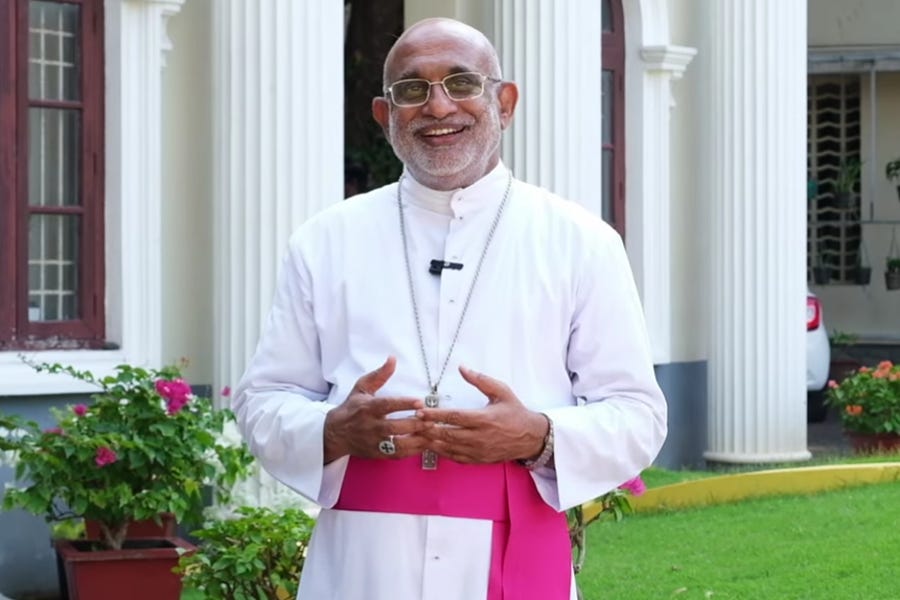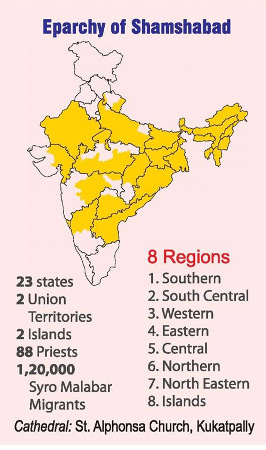
Pope confirms new Syro-Malabar leader’s election
Bishop Raphael Thattil is likely to lead the Eastern Catholic Church for the next decade.
Pope Francis confirmed Wednesday the appointment of a new leader of the Syro-Malabar Catholic Church.

In a Jan. 9 letter, the pope signaled his approval of the election of Bishop Raphael Thattil as the Major Archbishop of Ernakulam-Angamaly and ex officio head of the second-largest of the 23 Eastern Catholic Churches in full communion with Rome after the Ukrainian Greek Catholic Church.
Thattil, who has led the Eparchy of Shamshabad since its creation in 2017, was elected the same day by the 53 voting members of the Syro-Malabar Church’s synod of bishops meeting at the Eastern Church’s St. Thomas Mount headquarters in Kakkanad, in the southern Indian state of Kerala.
Thattil succeeds Cardinal George Alencherry, who resigned Dec. 7 at the age of 78, after 12 years in charge of the dynamic but divided sui iuris Church with more than 4 million members that traces its roots to the missionary work of St. Thomas the Apostle.
One of Thattil’s biggest challenges as major archbishop will be to ease the decades-long liturgical dispute centered on his new Archeparchy of Ernakulam-Angamaly.
Initial reactions to his appointment in the archeparchy appeared to be positive.
Fr. Joyce Kaithakottil, one of 12 priests elected last year to an ad hoc committee representing the archeparchy’s clergy in talks with synod representatives, said: “I welcome his election and wish him all the best in his mission in the present scenario of the Church.”
Kaithakottil told The Pillar Jan. 10 via WhatsApp that the new major archbishop was closely associated with the archeparchy after his ordination as a priest in the Archeparchy of Thrissur in 1980 and as rector of Thrissur’s major seminary from 1998 to 2006.
“He is ready for dialogue and he will look for possibilities to find a solution to the crisis,” said Kaithakottil. “He may not focus on the crisis, rather on the way out of the crisis through dialogue.”
“I am hopeful about the new major archbishop because I believe that he would not take a dictatorial style of authority but an amicable way of accommodating differences, and he can even brief Pope Francis with regard to the ground realities of the liturgical dispute.”
At the age of 67, Thattil is likely to lead the Eastern Church for the next decade and to receive the cardinal’s red hat, like his predecessors.
Electors may have been drawn to him because he hasn’t been embroiled in the sometimes violent liturgical disagreements that erupted in the Ernakulam-Angamaly archeparchy after the synod mandated in 2021 the use of a new uniform version of the Syro-Malabar Eucharistic liturgy, which is known as the Holy Qurbana.
The vast majority of the archeparchy’s priests and lay people want to continue celebrating a form of the liturgy in which the priest faces the congregation throughout, rather than turning toward the altar during the Liturgy of the Eucharist, as the uniform liturgy prescribes, following the Eastern Church’s ancient tradition.
Priests and laity want the liturgy facing the people to be recognized as a legitimate variant, arguing that it reflects the liturgical vision of Vatican II and is well-established after more than 50 years of use.

The Eparchy of Shamshabad, which Thattil has led since 2017, is one of the most distinctive of the Syro-Malabar Church’s 35 dioceses.
While several Syro-Malabar dioceses are based in the Church’s heartland of Kerala state, on India’s southwestern Malabar Coast, the Shamshabad eparchy covers 23 Indian states, four union territories (federal territories), and two islands (Lakshadweep and the Andamans).
Pope Francis established the eparchy in 2017 to “provide for the pastoral care of the Syro-Malabar faithful throughout India,” naming Thattil as its first bishop. It serves around 120,000 Catholics, considerably fewer than the roughly 655,000 in his new Archeparchy of Ernakulam-Angamaly but spread over a far larger geographical area.
Leading an eparchy that stretches across the Indian subcontinent is likely to have given Thattil a broad perspective on the challenges facing the country’s Christian minority. The United Christian Forum, a human rights group in New Delhi, recorded more than 500 violent incidents affecting Christians in 23 of India’s 28 states in the first eight months of 2023, and Christians have been targeted amid an ethnic conflict in the northeastern state of Manipur.
Thattil was born in Thrissur, Kerala, in 1956, his parents’ 10th son. He was ordained a priest in 1980.
He earned a doctorate in Eastern canon law at Rome’s Pontifical Oriental Institute and was appointed an auxiliary bishop of Thrissur in 2010, at the age of 53.
In 2013, he was named apostolic visitor for the Syro-Malabar faithful residing in India but outside of the Eastern Church’s proper territory (territorium proprium).
Since 2018, he has served as the ecclesiastical adviser to Jesus Youth, a charismatic movement recognized by the Vatican and active in more than 25 countries. He is fluent in Malayalam and English, and also proficient in Italian and German.
Thattil’s installation as the Syro-Malabar Church’s fourth major archbishop is due to take place Jan. 11 at the St. Thomas Mount headquarters in Kakkanad.
Local media quoted Thattil as saying: “I did not come to this synod thinking of becoming a major archbishop. But if that is God’s command, I have no choice but to surrender.”






What are our chances of reading an interview and in-depth profile? In the next few weeks?
I’d love to hear from a corner of the Church that is waaaay outside everyone’s bubbles.